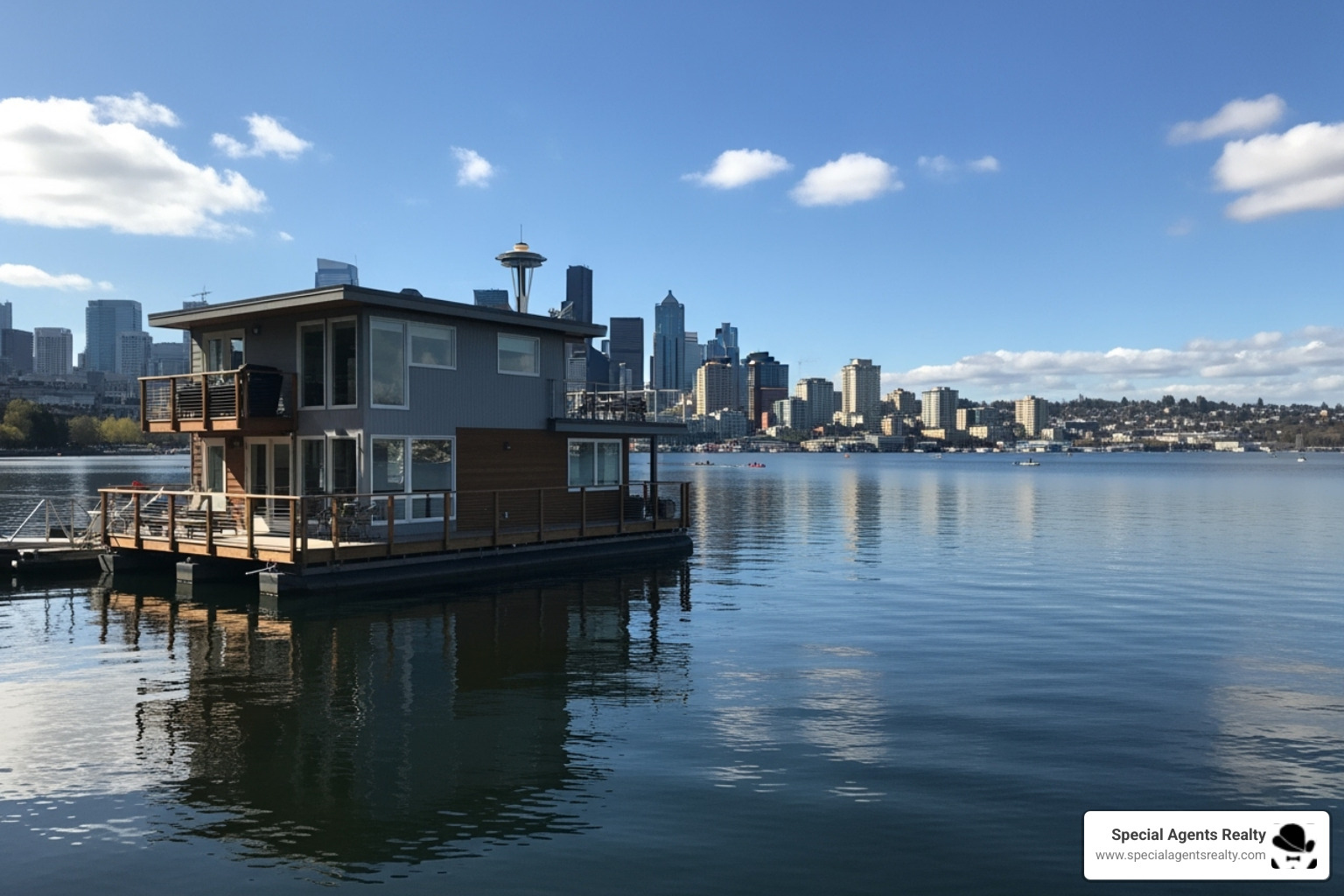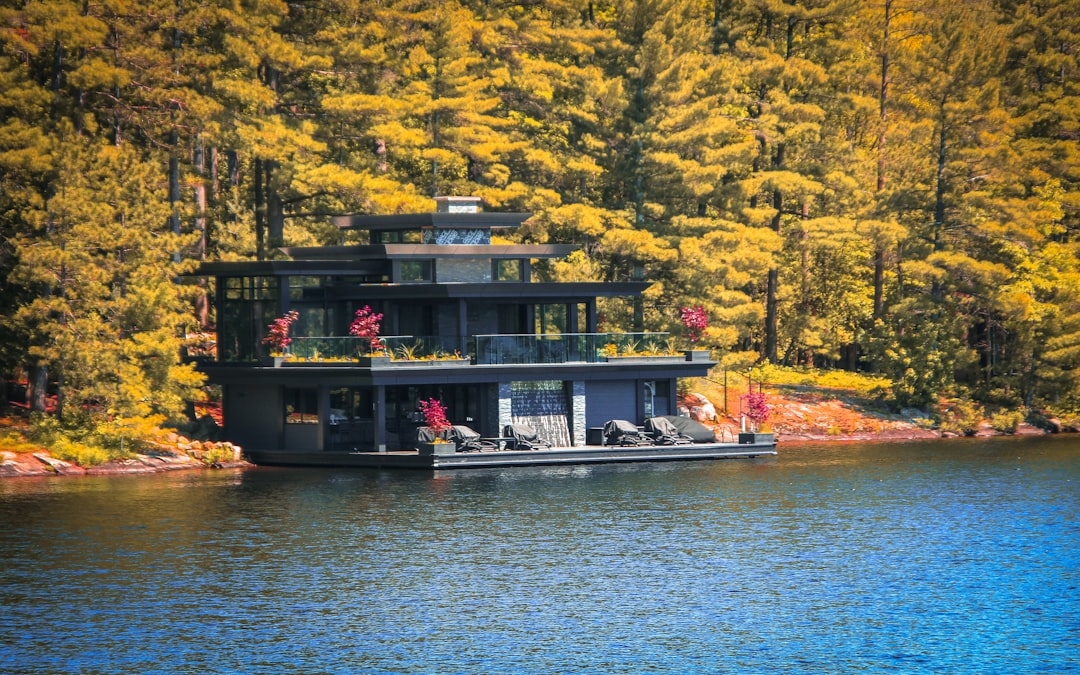
Is Waterfront Living Calling Your Name?
Buying a houseboat offers a unique path to waterfront living, blending home comforts with the serenity of life on the water. As high housing prices limit options, many buyers see houseboats as an affordable alternative to traditional waterfront property.
Quick Guide to Buying a Houseboat:
- Understand the basics - Houseboats are mobile living vessels, with prices from $30,000 to $500,000+.
- Budget for total costs - Include purchase price, mooring fees ($350-$1,000/month), insurance, and maintenance.
- Find financing - Secure personal loans or marine financing, not traditional mortgages.
- Get a marine survey - A professional inspection of the hull and systems is essential.
- Secure a mooring - Find a slip or dock before buying, as availability is often limited.
- Work with specialists - Hire a real estate agent and marine surveyor experienced in houseboats.
- Review regulations - Understand local liveaboard rules, registration, and taxes.
However, buying a houseboat involves unique considerations, from hull inspections and mooring agreements to marine financing and vessel registration. This guide walks you through every step, from choosing the right houseboat to casting off into your new waterfront life.
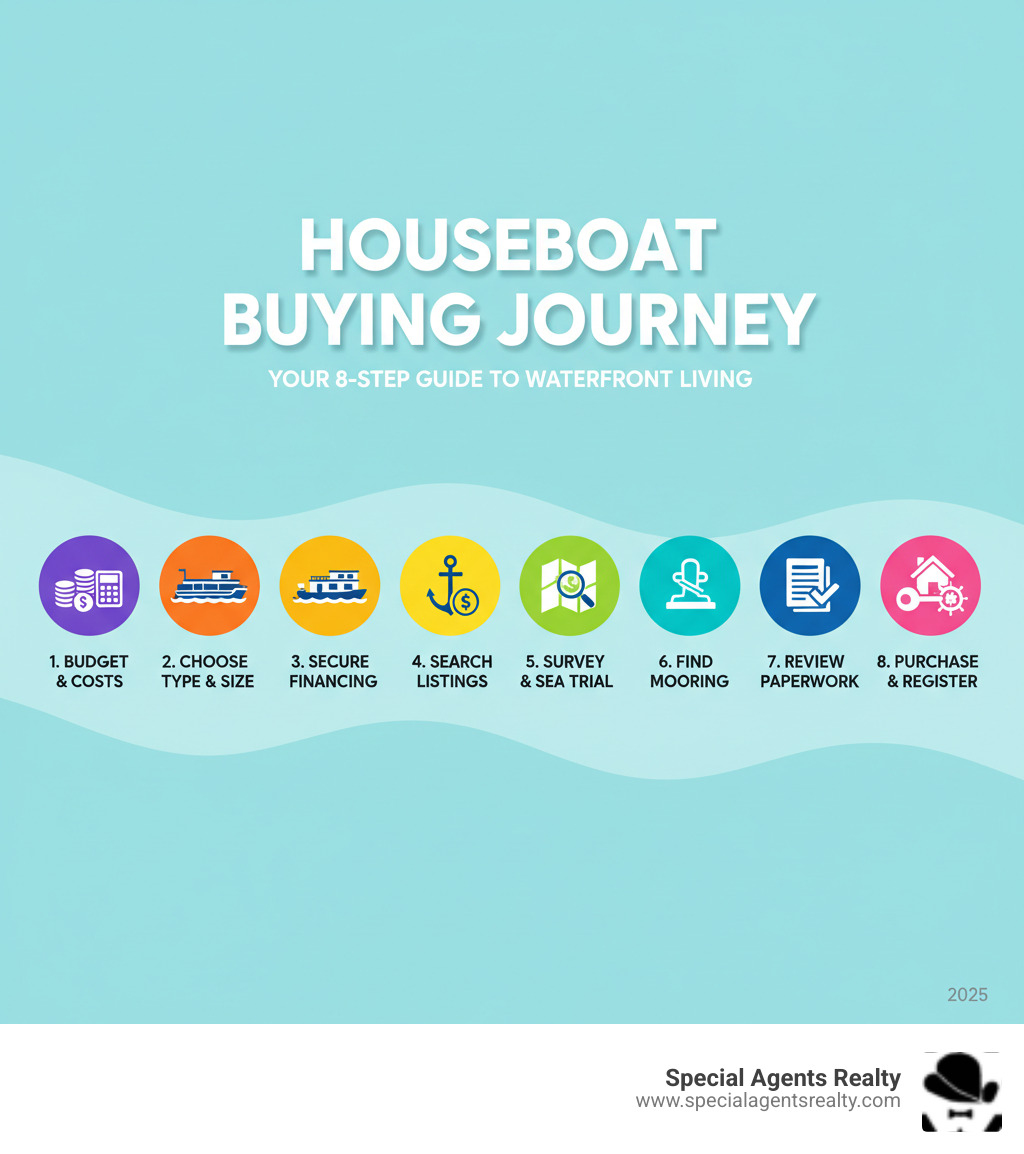
Understanding the Basics of Houseboat Life
Before you dive into houseboat living, it's important to understand what it truly entails. It's a unique lifestyle with incredible rewards and specific challenges.
What is a Houseboat?
A houseboat is a vessel designed for living on the water, prioritizing comfort and space over speed. They are built for calm waters like lakes, rivers, and sheltered coastal areas. When buying a houseboat, it's crucial to understand the legal distinction between a houseboat and a floating home, as it impacts financing, taxes, and insurance.
- Houseboats are considered vessels or personal property. They are mobile, have engines or can be towed, and are financed with personal or marine loans, not mortgages. They are registered as vessels and subject to sales tax.
- Floating homes are more like traditional houses on permanent floating foundations. They are usually stationary, connected to city utilities, and often classified as real estate, involving different financing and property tax rules.
This guide focuses on houseboats, which generally range from $30,000 to over $500,000.
The Allure and Challenges of Life on the Water
The appeal of houseboat living is undeniable, especially in the Pacific Northwest's thriving communities on Lake Union and Puget Sound.
The Allure:
- Waterfront Views: Enjoy serene, natural beauty every day.
- Affordability: Access a waterfront lifestyle for a fraction of the cost of a traditional home. Used models can start around $60,000.
- Community: Marinas often foster tight-knit, supportive communities.
- Simplicity: The lifestyle encourages minimalism and a closer connection to nature.
The Challenges:
- Limited Space: Houseboats are smaller than land-based homes, requiring clever storage and a minimalist mindset.
- Constant Maintenance: Vessels require specialized, regular upkeep, including hull inspections and marine-grade repairs.
- Mooring: Finding a slip can be difficult and expensive, with monthly fees from $350 to over $1,000.
- Weather: You'll be more exposed to wind, rain, and storms.
Exploring the Types, Sizes, and Styles of Houseboats
Houseboats come in various forms, each suited to different needs. Understanding the types, sizes, and styles of houseboats will help you choose the right one.
- Pontoon houseboats offer great stability and deck space, ideal for lakes.
- Barge-style houseboats have flat bottoms, maximizing interior living area.
- Full hull houseboats look more like traditional boats and are better for cruising.
Sizes range from cozy 25-footers to expansive 100-foot models, with an average around 64 feet. You'll find them in calm waters across the Pacific Northwest, from Seattle's Lake Union to marinas in Bremerton, Kirkland, and Bothell. Your choice depends on whether you prioritize mobility, space, or a blend of both.
The Financial Side of Buying a Houseboat
Buying a houseboat involves a unique financial landscape. Understanding the full cost breakdown is key to navigating the process with confidence.
Budgeting for Your Floating Dream: A Cost Breakdown
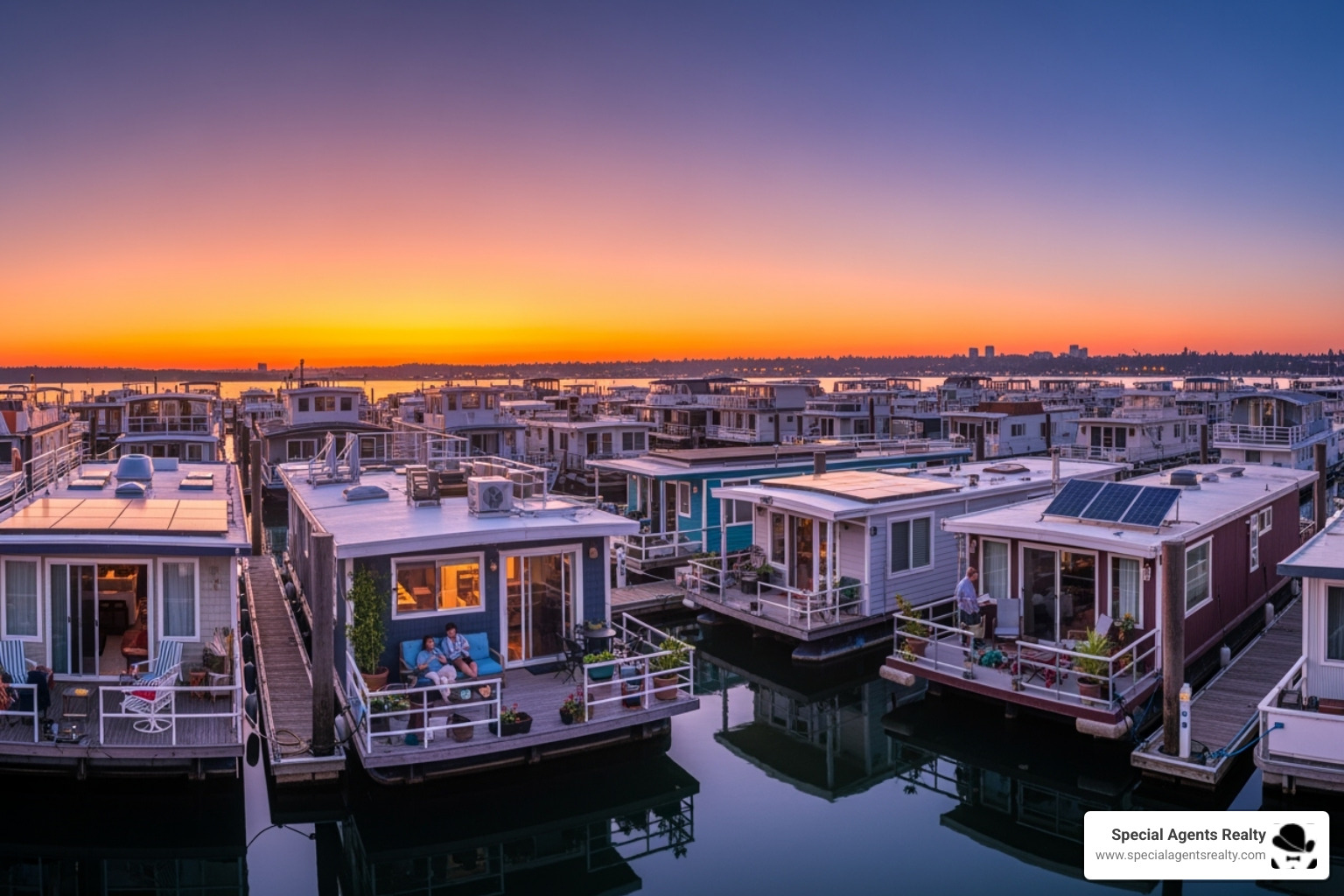
Look beyond the initial price tag to understand the total cost of ownership.
- Purchase Price: A used houseboat can start around $60,000, while new or luxury models can exceed $500,000. A comfortable, 50-foot, two-story model might cost around $350,000.
- Mooring Fees: This is your "rent" for the water space, typically ranging from $350 to over $1,000 per month. These fees often include water, sewer, and garbage services.
- Maintenance: Budget $1,000 to $5,000 annually for routine upkeep like engine servicing, hull inspections, and system repairs. Every few years, the hull will need to be repainted to prevent corrosion.
- Utilities: Beyond what's included in mooring, you'll pay for electricity, propane, internet, and sewage pump-outs (around $20/month).
- Marine Insurance: This specialized insurance is mandatory. Costs vary based on the boat's value, age, and location, but expect to pay more than standard homeowner's insurance.
Financing and Investment Potential
You can't get a traditional mortgage for a houseboat because it's considered personal property. Instead, financing options include:
- Personal loans from banks or credit unions.
- Marine lenders who specialize in boat financing.
- Seller financing in some cases.
Expect shorter loan terms (not 30 years), potentially higher interest rates, and a down payment of at least 20%.
As for investment, houseboats typically depreciate over time, much like an RV or car. However, a well-maintained boat in a prime location can hold its value well. The key factors are age, condition, and location. Many owners also offset costs by using their houseboat as a vacation rental on sites like Airbnb, but be sure to check local short-term rental regulations first. The primary "return on investment" is the unparalleled lifestyle.
The Step-by-Step Process of Buying a Houseboat
Ready to turn your dream into reality? Buying a houseboat is a manageable process with the right approach. Here’s a step-by-step guide.
Key Factors to Consider When Buying a Houseboat
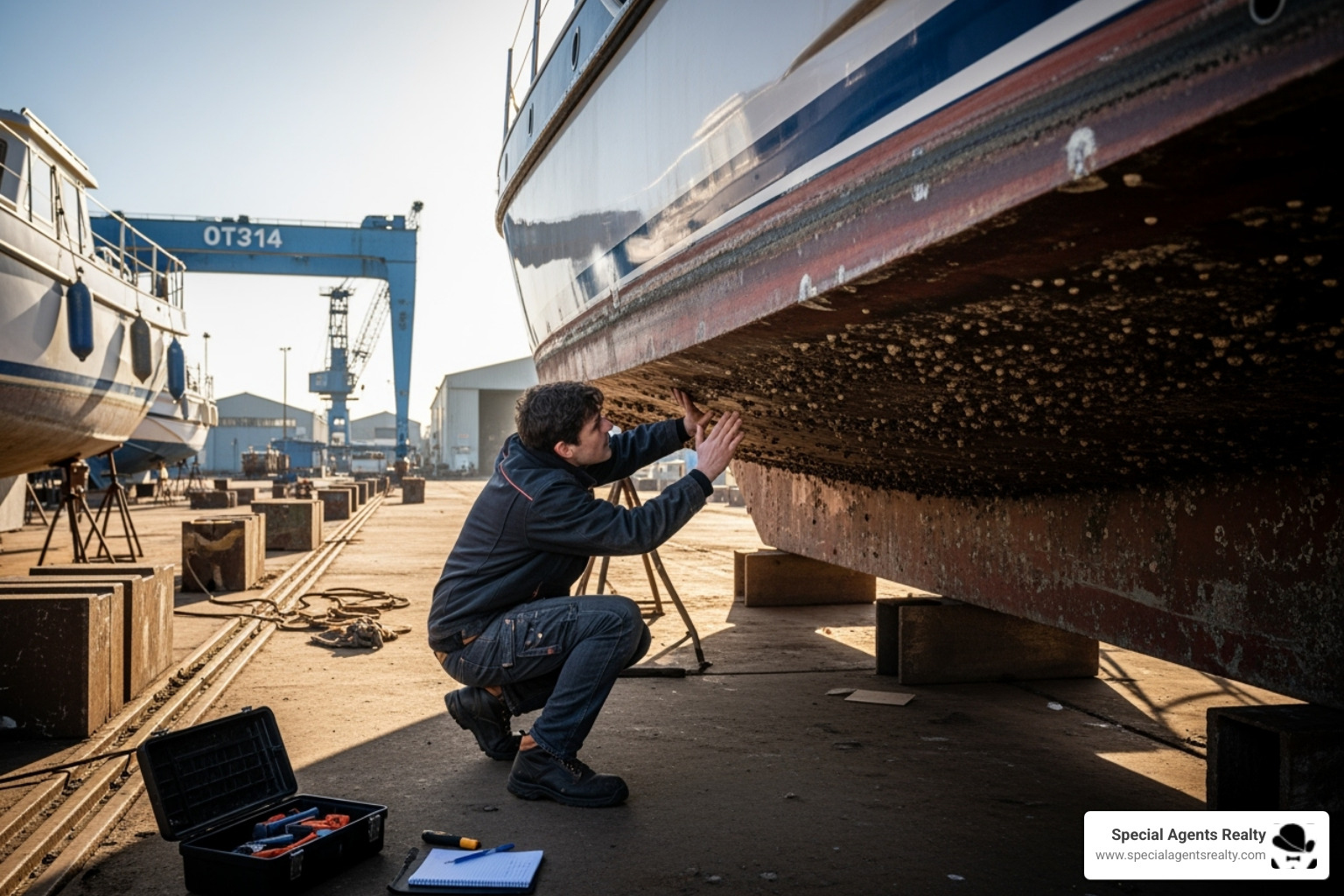
Before you start your search, focus on these critical elements:
- The Hull: This is your foundation. Steel hulls are sturdy but need regular anti-rust coating. Fiberglass is low-maintenance but can be costly to repair. A thorough hull inspection is your top priority.
- Size and Layout: Consider how you'll use the space. Do you need room for guests or a home office? A functional layout with smart storage is more important than raw square footage.
- Location and Mooring: Finding a place to keep your houseboat can be the biggest challenge. Mooring slips in desirable areas like Lake Union are scarce and can have long waiting lists. Monthly fees range from $350 to over $1,000. It's wise to secure your mooring before buying a boat or find one with a transferable slip. Some slips are leased, while others are owned like a condo, which involves property taxes but offers more security.
Navigating the Purchase: From Search to Survey
Once you know what you need, the hunt begins.
- Finding a Houseboat: Start on online marketplaces like Boat Trader. Also, contact marinas directly in areas like Seattle, Bremerton, or Kirkland, as some sales happen within the community and may include a slip.
- The Marine Survey: This is a non-negotiable step. A qualified marine surveyor will conduct a comprehensive inspection of the hull, mechanical systems, wiring, and safety equipment, similar to a home inspection. The survey, which includes a "sea trial" to test operations, is often required for financing and insurance. The report provides a clear picture of the boat's condition and is a powerful tool for negotiation.
- Negotiation: Use the survey findings to negotiate a lower price or request repairs from the seller. A good broker or agent can be invaluable here.
The Importance of a Specialized Real Estate Agent
While a boat broker handles vessel sales, a real estate agent specializing in houseboats understands both the marine and property aspects of the transaction. They can decode complex listings and help you understand if you're buying the structure, the slip, or just access rights.
The biggest challenge is often finding a liveaboard-approved slip. "It can be helpful to have an agent to assist with locating liveaboard docking slips and to help during the negotiation stage," says a real estate expert at Special Agents Realty. "Houseboat listings read a lot differently than house listings—having a knowledgeable agent is key." An agent with connections in the Puget Sound marina communities knows where to look and can guide you through local regulations, ensuring a smooth and successful purchase.
Legalities and Logistics of Houseboat Ownership
Before casting off, you'll need to steer some essential paperwork and regulations. This is the less glamorous but crucial side of buying a houseboat.
Paperwork and Regulations You Can't Ignore
Getting your documents in order is a straightforward but necessary process.
- Vessel Registration and Titling: Your houseboat must be registered with the state (and potentially the U.S. Coast Guard), which involves getting a title and registration numbers, much like a car.
- Marine Insurance: A specialized marine policy is required to protect your investment against damage, theft, and liability. Be sure to declare your liveaboard status to your insurer.
- Local Liveaboard Rules: Marinas have strict bylaws regarding full-time residents. Some have long waiting lists for liveaboard slips. Always review the marina's rules before you buy.
- Safety and Environmental Regulations: Your boat must meet safety standards (fire extinguishers, life jackets, etc.) and comply with environmental rules for waste disposal and pollution prevention.
Understanding Taxes and Fees When Buying a Houseboat
The tax situation for houseboats depends on classification and location.
- Property Tax: Because houseboats are typically classified as personal property, you usually don't pay property tax on the vessel itself. However, as Brandon Eshaghoff of The American Houseboat notes, "If you own a slip, you would need to pay property taxes on the slip as it is real property."
- Sales Tax: Expect to pay a one-time sales tax on the purchase price of the houseboat.
- Ongoing Fees: Your main recurring costs will be monthly marina dues or mooring fees ($350-$1,000+). If your slip is in a co-op or condo-style marina, you may also pay HOA fees for common area maintenance.
Frequently Asked Questions about Buying a Houseboat
Buying a houseboat can bring up many questions. Here are answers to some of the most common concerns.
Do houseboats hold their value?
Most houseboats depreciate over time, similar to vehicles. However, a well-maintained houseboat in a prime location can hold its value remarkably well. Consistent upkeep—including hull maintenance, system servicing, and cosmetic updates—is the best way to protect your investment. Location also plays a huge role; a slip in a desirable Puget Sound marina will always be in demand, helping to stabilize the boat's value. While you may not see the capital gains of traditional real estate, the return on lifestyle is immense.
Can you live on a houseboat year-round?
Yes, many people live on houseboats full-time. Modern houseboats are equipped with all the necessities for year-round comfort, including heating and insulation. In the Pacific Northwest, winterizing is important to protect plumbing from occasional freezes, but our relatively mild climate is quite forgiving for full-time life on the water. Preparing for seasonal storms and ensuring your heating system is reliable are key parts of the year-round routine.
How much does it really cost to own a houseboat per month?
Your monthly costs will vary, but here's a general breakdown, excluding any loan payments:
- Mooring Fees: Your biggest expense, typically $350 to over $1,000 per month in the Pacific Northwest. This often includes water, sewer, and garbage.
- Insurance: A comprehensive marine policy could run from $100 to $300+ per month, depending on the boat's value.
- Utilities: Budget $100 to $300 for electricity, propane, and internet.
- Maintenance Fund: Set aside $80 to $400 per month ($1,000-$5,000 annually) for routine upkeep and unexpected repairs.
- Miscellaneous: Factor in about $20 per month for sewage pump-outs.
In total, expect monthly costs to range from $600 on the low end to $2,000 or more for a larger boat in a prime marina. Even at the higher end, this is often more affordable than renting an apartment in cities like Seattle.
Conclusion: Your New Life on the Water Awaits

Buying a houseboat is more than a transaction; it's a lifestyle choice. It's about waking up to water views, embracing simplicity, and joining a unique, tight-knit community.
We've covered the essentials: understanding the difference between houseboats and floating homes, budgeting for all costs, navigating the purchase process, and handling the legalities. You know the importance of a marine survey and the challenge of securing a mooring slip. While there are unique responsibilities like constant maintenance, the rewards—tranquility, affordability, and a deep connection to nature—are extraordinary.
If you're ready to explore waterfront living in the Pacific Northwest, you don't have to go it alone. The team at Special Agents Realty understands the local market, from Seattle's Lake Union to marinas throughout Puget Sound. We provide the expert guidance and stress-free process you need for a successful real estate journey, whether on land or water.
Your new life is waiting. Are you ready to cast off?
.avif)

